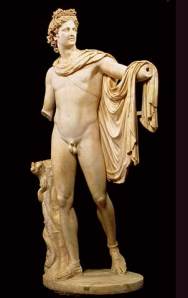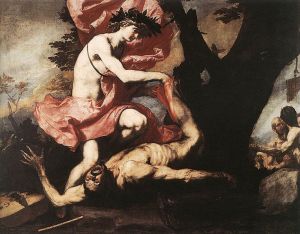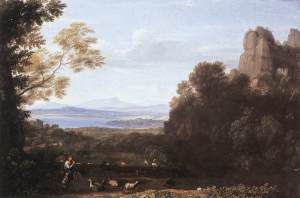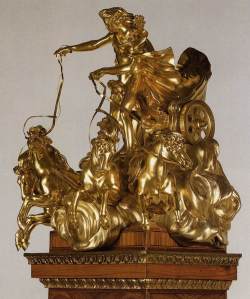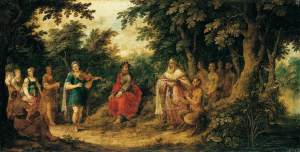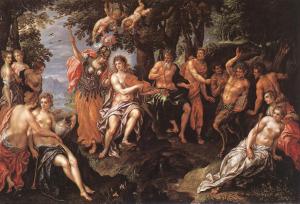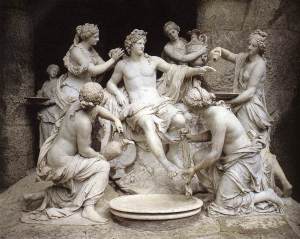- Origin: For the Greeks, Apollo was all the gods in one, and through the centuries he acquired different functions which could originate from different gods. He has Dorian, Minoan, and Anatolian origins.
- Aliases: Aplu (Etruscan Name), Ekhi (Basque name), Lyceius, Paul Belvedere, Rene Andre, Apollo Reason, (mortal aliases) – (He was often confused with the sun-god Helios)
- Physical Characteristics: The ideal of the kouros. He is considered to be the archetype of masculinity. He is portrayed as handsome, clean-shaven, athletic and young.
- Personality Characteristics: He is usually calm, collected, aloof, intelligent, controlled, and sane.
- Art depicting or referencing Apollo:
- Poems:
Archaic Torso of Apollo |
||
| by Rainer Maria Rilke translated by Stephen Mitchell |
||
We cannot know his legendary head with eyes like ripening fruit. And yet his torso is still suffused with brilliance from inside, like a lamp, in which his gaze, now turned to low, gleams in all its power. Otherwise the curved breast could not dazzle you so, nor could a smile run through the placid hips and thighs to that dark center where procreation flared. Otherwise this stone would seem defaced beneath the translucent cascade of the shoulders and would not glisten like a wild beast's fur: would not, from all the borders of itself, burst like a star: for here there is no place that does not see you. You must change your life. |
||
Ovid’s Metamorphoses: Competition between Pan and Apollo
While Pan was boasting there to mountain nymphs
of his great skill in music, and while he
was warbling a gay tune upon the reeds,
cemented with soft wax, in his conceit
he dared to boast to them how he despised
Apollo’s music when compared with his–.
At last to prove it, he agreed to stand
against Apollo in a contest which
it was agreed should be decided by
Tmolus as their umpire.This old god
sat down on his own mountain, and first eased
his ears of many mountain growing trees,
oak leaves were wreathed upon his azure hair
and acorns from his hollow temples hung.First to the Shepherd-god Tmolus spoke:
“My judgment shall be yours with no delay.
Pan made some rustic sounds on his rough reeds,
delighting Midas with his uncouth notes;
for Midas chanced to be there when he played.
When Pan had ceased, divine Tmolus turned
to Phoebus, and the forest likewise turned
just as he moved. Apollo’s golden locks
were richly wreathed with fresh Parnassian laurel;
his robe of Tyrian purple swept the ground;
his left hand held his lyre, adorned with gems
and Indian ivory. His right hand held
the plectrum–as an artist he stood there
before Tmolus, while his skilful thumb
touching the strings made charming melody.Delighted with Apollo’s artful touch,
Tmolus ordered Pan to hold his reeds
excelled by beauty of Apollo’s lyre.
That judgment of the sacred mountain god
pleased all those present, all but Midas, who
blaming Tmolus called the award unjust.”
Hymn To Apollo
John Keats
God of the golden bow,
And of the golden lyre,
And of the golden hair,
And of the golden fire,
Charioteer
Of the patient year,
Where---where slept thine ire,
When like a blank idiot I put on thy wreath,
Thy laurel, thy glory,
The light of thy story,
Or was I a worm---too low crawling for death?
O Delphic Apollo!
The Thunderer grasp'd and grasp'd,
The Thunderer frown'd and frown'd;
The eagle's feathery mane
For wrath became stiffen'd---the sound
Of breeding thunder
Went drowsily under,
Muttering to be unbound.
O why didst thou pity, and beg for a worm?
Why touch thy soft lute
Till the thunder was mute,
Why was I not crush'd---such a pitiful germ?
O Delphic Apollo!
The Pleiades were up,
Watching the silent air;
The seeds and roots in Earth
Were swelling for summer fare;
The Ocean, its neighbour,
Was at his old labour,
When, who---who did dare
To tie for a moment, thy plant round his brow,
And grin and look proudly,
And blaspheme so loudly,
And live for that honour, to stoop to thee now?
O Delphic Apollo!
Homeric Hymn to Pythian Apollo
http://ancienthistory.about.com/library/bl/bl_text_homerhymn_pyth.htm
- Literature:
The Illiad
Latin literature
